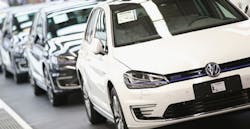New Emissions Tests Slash German Car Sales in September
Sales of new cars in Germany plunged in September, official data showed on Oct. 2, as updated EU emissions tests turned into a bottleneck for many manufacturers.
New registrations were down 30.5 % year-on-year last month, at 200,134 units, the KBA transport authority said.
But the September slump comes after a surge in August, as carmakers scrambled to bring older models onto the road before the new testing regime, known as WLTP, came into force.
Introduced in the wake of Volkswagen's "dieselgate" scandal, in which millions of diesel-fueled cars worldwide were fitted with software to cheat lab-based tests, the new scheme aims to better reflect emissions in real on-road driving.
The disruption led to some upsets in the monthly figures.
As it struggled to get cars over the hurdle, Volkswagen's market share for September fell to just 10.1% -- compared with 19.1% for the year to date.
It was overtaken by high-end manufacturers BMW with 12.3% and Mercedes at 11.2%.
Even Peugeot-owned Opel -- a historic German brand that usually appears as an also-ran in the home market -- outpaced VW, with 10.2% of sales.
Meanwhile, even with many fewer cars sold, diesel's market share continued to shrink, notching up just 29.3% of registrations compared with 64.3% for petrol.
Earlier on Oct. 2, ministers presented a plan aiming to avoid exclusion zones for older diesels in Germany's most polluted cities.
Politicians are counting on industry-funded trade-in schemes for newer models and refits to dated exhaust systems to restore public confidence in the technology.
Copyright Agence France-Presse, 2018
About the Author
Agence France-Presse
Copyright Agence France-Presse, 2002-2025. AFP text, photos, graphics and logos shall not be reproduced, published, broadcast, rewritten for broadcast or publication or redistributed directly or indirectly in any medium. AFP shall not be held liable for any delays, inaccuracies, errors or omissions in any AFP content, or for any actions taken in consequence.
